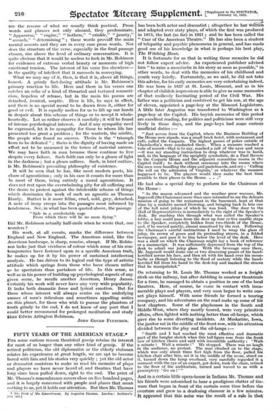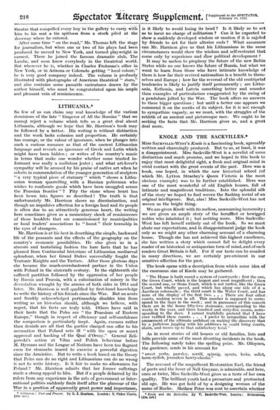FIFTY YEARS OF THE AMERICAN STAGE.* Fon some curious reason
theatrical gossip retains its interest for most of us longer than any other kind of gossip. If the retired politician, the old diplomatist or the elderly clubman relates his experiences at great length, we are apt to become bored with him and his stories very quickly ; yet the old actor or dramatist contrives to make us read his memoirs of plays and players we have never heard of, and theatres that have long since • been pulled down, right to the end. The print of Mr. Thomas's remembrance covers close on five hundred pages, and it is largely concerned with people and places that mean nothing to us, yet it holds our attention. But then Mr. Thomas • The Print of Mt, Besnembrance. By Augustus Thomas. London: Scribner's. 11Cs net.] has been both actor and dramatist ; altogether he has written and adapted over sixty plays, of =which the first was produced in 1875, the last (so far) in 1921 ; and he has been called the " Czar of the American Theatre." He has also been a student of telepathy and psychic phenomena in general, and has made good use of his knowledge in what is perhaps his best play, The Witching Hour.
It is fortunate for us that in writing these memoirs he did not follow expert advice. An experienced publisher advised him " to raise a moustache in his story as soon as possible," in other words, to deal with the memories of his childhood and youth very briefly. Fortunately, as we said, he did not take this advice, for his early memories are very entertaining indeed. He was born in 1857 at St. Louis, Missouri, and so in his chapter of childish impressions is able to give us some memories of that endlessly fascinating period of the Civil War. His father was a politician and contrived to get his son, at the age of eleven, appointed a page-boy at the Missouri Legislature. A little later Augustus was transferred to Washington as a page-boy at the Capitol. His boyish memories of this period are excellent reading, for politics and politicians were still very lively in those days, and the page-boys had ,some curious unofficial duties :—
" Just across from the Capitol, where the Business Building of the House now stands, was a small brick hotel, with restaurant and café, called the Casparis. The highest games of poker outside of Chamberlin's were conducted there. When a measure reached a vote of record—that is to say, reached a call of the ayes and nays —it was my standing instruction to drop whatever was in hand, and, in the language of the sprightly symbolists, do a Paul Revere to the Casparis House and the adjacent committee rooms in the Capitol itself ; to dash without ceremony into the rooms where the men were handling the chips and pasteboards, and cry : ' Calling the roll on the admission of Virginia,' or whatever the measure happened to be. The players would then make the best time possible to their places in the House. . . ."
He had also a special duty to perform for the Chairman of the House :
" As the season advanced and the weather grew warmer, Mr. Ingersoll (the Chairman) more than once intrusted to me the delicate mission of going to the restaurant in the basement, kept at that time by a mulatto named Downing, and bringing back to him one of the tall mint juleps of which he was fond. One door to the Hall of Representatives is immediately to the right of the Speaker's desk. By reaching this through what was called the Speaker's lobby, a boy could pass from the door up four or five marble steps to the Speaker, completely hidden from two-thirds of the House, and, if he moved quietly, almost unnoticed by the rest. Following the Chairman's careful instructions I used to wrap the glass of julep, its crown of green and its protruding straws, in a folded newspaper, and pass it to him below the level of the desk. Here was a shelf on which the Chairman might lay a book of reference or a manuscript. It was sufficiently depressed from the top of the desk to admit our julep glass. With the beverage once there, Mr. Ingersoll would make one or two disarming passes of his hand- kerchief across his face, and then sit with his hand over his mouse tache as though listening to the flood of oratory while the hand- kerchief fell from his hand to the desk-top and masked the straws- that he manipulated."
On returning to St. Louis Mr. Thomas worked as a freight clerk on the railway, but after dabbling in amateur theatricals for a time, he managed to obtain a position in one of the local theatres.. Here, of course, he came in contact with innu- merable plays and players, and very soon began to write one. act plays himself. With some friends he formed a touring company, and his adventures on the road make up some of his best chapters. Some of the playhouses in the South and Middle-West, where they mostly toured, were very primitiVe affairs, often lighted with nothing better than oil-lamps, which gave" rise to some diverting .incidehts. At Muskatine, Iowa, the janitor sat in the middle of the front row, with his attention divided between the play and the oil-lamps :— " Smith and I had reached the most effective and dramatic part of the burglar sketch when this tall figure rose from the front row of kitchen chairs and said with irresistible authority : Wait a minute Wait a minute I ' We stopped. There was no laugh in the audience, no protest. The man climbed on to the stage, which was only about three feet high from the floor, pulled his kitchen chair after him, set it in the middle of the scene, stood on it, turned down the lamp overhead, very carefully regarded it a moment with the eye of an expert, got down, took the chair, retired to the floor of the auditorium, turned and waved to us with a peremptory ' Go on ! ' " And in a certain little opera-house in Indiana Mr. Thomas and his friends were astonished to hear a prodigious clatter of tin-. ware that began in front of the curtain some time before the overture and grew to a deafening clamour in a few minutes. It appeared that this noise was the result of a rule in that
theatre that compelled every boy in the gallery to carry with him to his seat a tin spittoon from a stock piled at the doorway where he entered.
After some time " on the road," Mr. Thomas left the stage for journalism, but when one or two of his plays had been produced he moved to New York, and turned playwright in earnest. There he joined the famous dramatic club, The Lambs, and soon knew everybody in the theatrical world. But wherever he is, whether in Charles Frolunan's office in New York, or in Arizona or Colorado getting " local colour," he is very good company indeed. The volume is profusely illustrated with photographs of American theatrical " stars," and also contains some passable caricatures drawn by the author himself, who must be congratulated upon his ample and pleasant vein of reminiscence.



































































 Previous page
Previous page